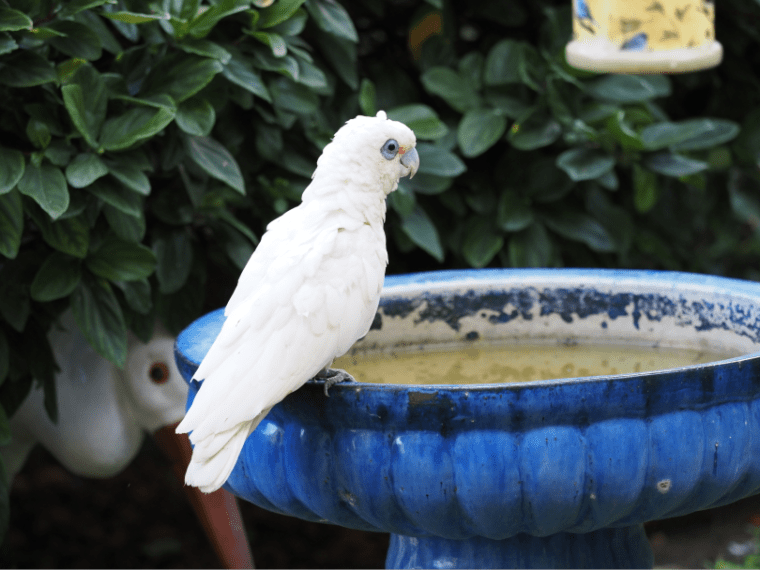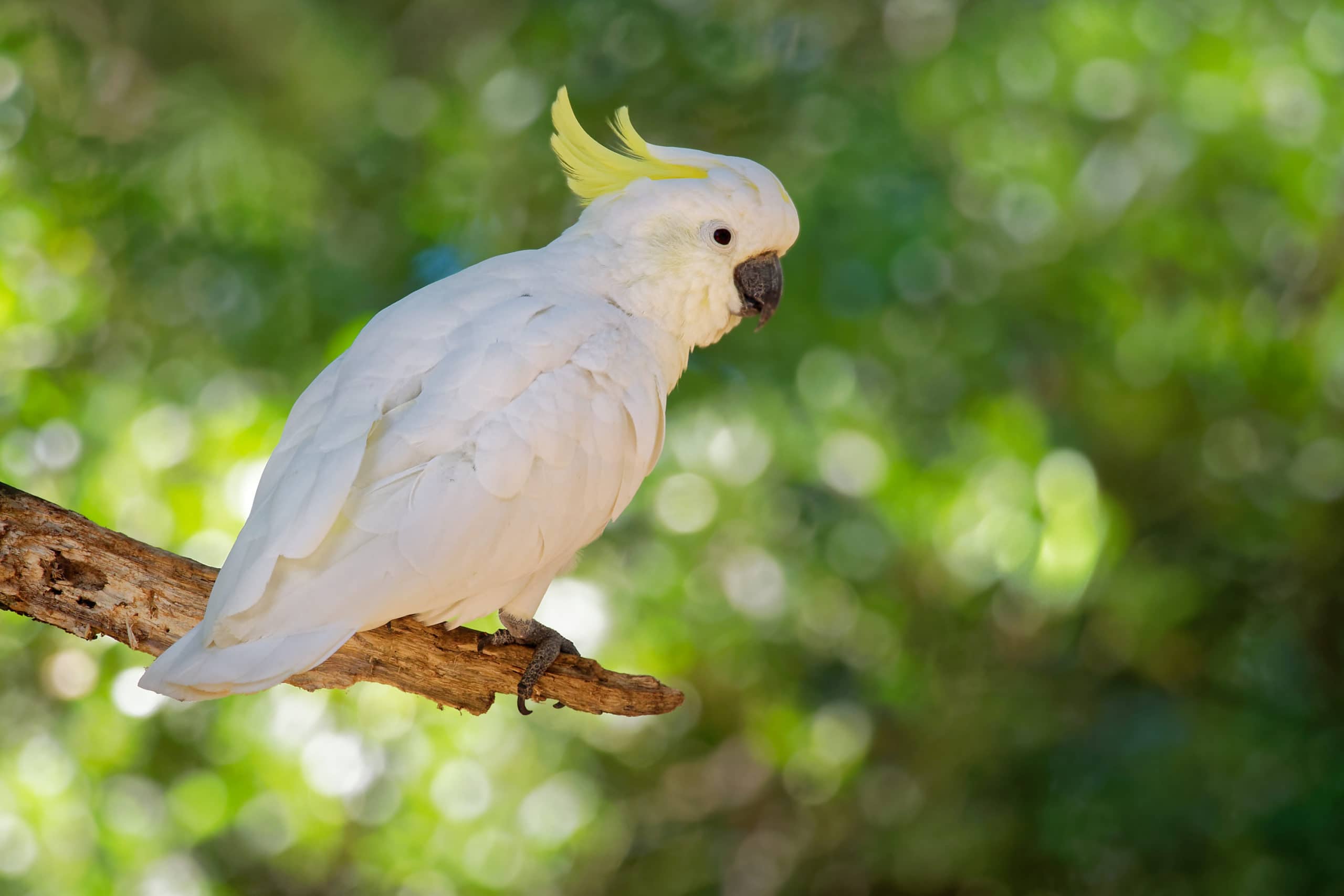
A colorful personality with a simple appearance, the Ducorp’s Cockatoo is a great choice for a family parrot. This Solomon Islands native is known for their fun-loving and goofy antics, along with their elegant white plumage.
But is the Ducorp’s Cockatoo the right parrot for you? Here, we discuss this parrot in detail!
Species Overview
| Common Names: | Ducorp’s Cockatoo, Solomon’s Cockatoo, Broad-Crested Corella |
| Scientific Name: | Cacatua ducorpsii |
| Adult Size: | Approximately 30-33cm (12-13 inches) |
| Life Expectancy: | Approximately 50 years or more |
Origin and History
The Ducorp’s Cockatoo finds its roots in Solomon Islands, hence their other common name of “Solomon’s Cockatoo”. Small populations of these birds can also be found on nearby islands such as Bouganville and Papua New Guinea. The Ducorp’s Cockatoo is a relatively new species to US aviculture due to their native islands being closed to the export of birds, where only a small number of this cockatoo was imported in 1993 in late 1993 to the United States.
The Ducorp’s Cockatoo is the only Cockatoo species in the region. This cockatoo thrives in dense forest environments and is not fond of open fields. They do not have many natural threats due to the remoteness of its habitat, allowing them to breed without interference.

Temperament
Despite having a simple color pattern of plain white, their personalities are the colorful opposite! These cockatoos areexclusive to the Solomon Islands are known for being goofy and sociable birds that love being the center of attention. They possess a certain charm exclusive to these white birds, never having a dull moment in their company.
The Ducorp’s cockatoos are intelligent birds that love playing games and doing tricks, so teaching your Ducorp’s some tricks and words can be used as a fun bonding experience with your bird. With their fun-loving attitude and constant craving of attention, owners and strangers alike will always find new ways to enjoy their pet cockatoo. The Ducorp’s is also a good bird for households with other pets! Overall, the Ducorp’s cockatoo is an entertaining and intelligent bird perfect for families. This white bird will never fail to bring color to your household’s lives with their personality alone!
Speech & Vocalizations
Like most cockatoos, the Ducorp’s Cockatoo can imitate sounds, including speech! While not as accurate as other parrots, they can learn from 20-30 words with accuracy through mimicry. They also tend to babble and mimic inflection rather than the actual words, where they can pick up sounds from speech in the background or natural background noise (such as the barking of dogs).
Cockatoos have a colorful and attention-seeking behavior, making them very talkative and loud spontaneously so consider your living environment before getting a Ducorp’s Cockatoo as a pet!

Ducorp’s Cockatoo Cockatoo Colors and Markings
If there is one phrase to describe the appearance of the Ducorp’s Cockatoo – It is “elegance in simplicity”. Like all cockatoos, the Ducorp’s Cockatoo is also simple in appearance. The Solomon Island native possesses a certain gracefulness with their all-white appearance and pink accents around their face. Their beaks have a unique mix of pale blue and white color, and a blue ring that surrounds their deep, black eyes. These small markings and accents make them stand out despite their simple appearance.
The Ducorp’s Cockatoo has a neat and clean look that truly embodies the phrase “elegance in simplicity” that can steal the show without any effort.
Caring for the Ducorp’s Cockatoo
Activity and Housing
Ducorp’s cockatoos are very active birds, so they must always be provided with things to play with and chew on such as toys or pieces/blocks of wood. Ducorp’s tend to chew on furniture around if left unattended and then this can damage your home and may also cause harm to your pet bird. Being energetic, Ducorp’s must also have time and space for movement and flight, so a large case is recommended. It is recommended that these cockatoos are never left to roam around the house unsupervised.
Socialization
Socialization and exposure to different situations is recommended for your Ducorp’s development. Exposing them to different people and other animals can enhance their social skills when encountering strangers and other pets. Exposure to different situations such as changes of cages and veterinary trips can also help them with their fear and anxiety when changing environment as they get older.

Grooming
Routine baths are recommended to ensure that your bird has healthy skin and plumage. Light misting can be done all over their body and then gently dried with use of a blow drier. Feather maintenance is also very important but be very cautious when clipping their feathers as they are prone to falling and injuring themselves. Keep clipping to their primary flight feathers just to ensure that they can safely glide down to the floor.
Common Health Problems
The Ducorp’s Cockatoo are known for being generally healthy birds, with many of their common health complications being avoidable through use of a healthy diet, grooming, and attention.
They are prone to obesity, along with psittacine beak and feather diseases which is a viral infection among birds. These can be avoided through providing a healthy and balanced diet and appropriate exercise, while also ensuring that your pet birds’ surroundings are clean. The Ducorp’s is also susceptible to lesions on the feet, so it is recommended that they are given space to move around. Immediately seek veterinary consultation should you suspect any signs of illness from your Ducorp’s Cockatoo.
Common to cockatoos are their tendency to exhibit self-harming behaviors, such as picking of their feathers and skin. This can also be avoided by providing your Ducorp’s adequate attention and affection.

Diet and Nutrition
In the wild, the Ducorp’s Cockatoo generally feeds on fruits, crops, and insects. As a pet, however, a balanced diet can easily be achieved through high quality cockatoo seed mix! For supplementation, different fruits, vegetables, and grains can be given along with the seed mix for more vitamins and minerals.
It is recommended that half of your cockatoo’s daily servings of meals come from fruits, vegetables, and grains as consumption of seed mixes, if left unchecked, can lead to obesity. Using this as a basis, you can experiment with different combinations of foods to see what your pet bird likes. Cockatoo’s feeding times as pets are like their feeding times in the wild, which is in the morning and the evening. Ensuring that your pet bird has a healthy and balanced diet is key to having a healthy and happy Ducorp’s Cockatoo!
Exercise
For a fit and healthy Ducorp’s Cockatoo, at least 3-4 hours of play time outside the cage is recommended to meet your Ducorp’s exercise requirements in a day. The Ducorp’s is a very energetic bird, so a large cage to give your Ducorp’s to move while inside the cage is recommended as well. On top of this, 1 hour of interaction and play time with humans is also recommended to ensure your cockatoo gets his daily dose of love and affection!
Where to Adopt or Buy a Ducorp’s Cockatoo Cockatoo
Cockatoos are generally very common in the United States but finding a specific species of Cockatoo such as the Ducorp’s may need some extra searching. You may be able to find a Ducorp’s on websites such as PetFinder and The Golden Cockatoo and prices may range from $4,000-$6,000. You might also be able to find a Ducorp’s on adoption websites such as Rescue The Birds.
You might also find bird breeders that breed this specific cockatoo, but it is important to ensure that this breeder is reputable by thorough interview and inspection of facilities. Ducorp’s Cockatoos may be difficult to find but adopting one will be well worth the wait!
Conclusion
Like their other cockatoo counterparts, the Ducorp’s Cockatoo is a great family parrot with their intelligence, ability to socialize, and their overall entertainment factor as the center of attention. They can imitate sounds including speech and can be taught different tricks. The Ducorp’s can be talkative and loud, but this can be overcome with patience. The Ducorp’s Cockatoo is a great choice as there will never be a dull moment in its company!
Featured Image Credit: Wirestock Creators, Shutterstock








